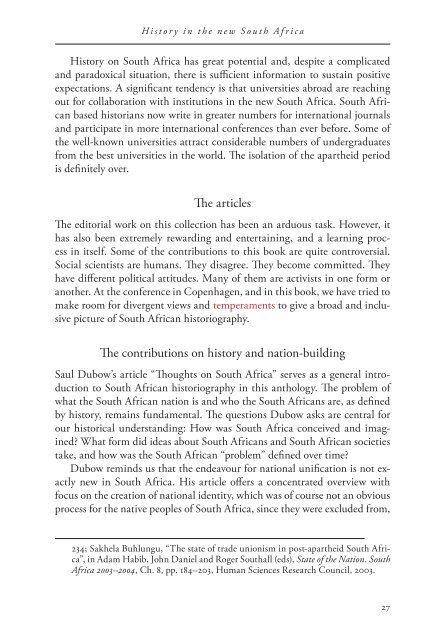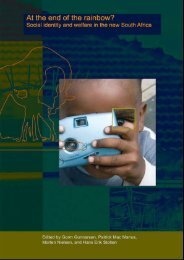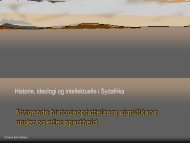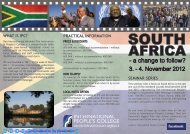History Making and Present Day Politics - Stolten's African Studies ...
History Making and Present Day Politics - Stolten's African Studies ...
History Making and Present Day Politics - Stolten's African Studies ...
You also want an ePaper? Increase the reach of your titles
YUMPU automatically turns print PDFs into web optimized ePapers that Google loves.
H i s t o r y i n t h e n e w S o u t h A f r i c a<br />
<strong>History</strong> on South Africa has great potential <strong>and</strong>, despite a complicated<br />
<strong>and</strong> paradoxical situation, there is sufficient information to sustain positive<br />
expectations. A significant tendency is that universities abroad are reaching<br />
out for collaboration with institutions in the new South Africa. South <strong>African</strong><br />
based historians now write in greater numbers for international journals<br />
<strong>and</strong> participate in more international conferences than ever before. Some of<br />
the well-known universities attract considerable numbers of undergraduates<br />
from the best universities in the world. The isolation of the apartheid period<br />
is definitely over.<br />
The articles<br />
The editorial work on this collection has been an arduous task. However, it<br />
has also been extremely rewarding <strong>and</strong> entertaining, <strong>and</strong> a learning process<br />
in itself. Some of the contributions to this book are quite controversial.<br />
Social scientists are humans. They disagree. They become committed. They<br />
have different political attitudes. Many of them are activists in one form or<br />
another. At the conference in Copenhagen, <strong>and</strong> in this book, we have tried to<br />
make room for divergent views <strong>and</strong> temperaments to give a broad <strong>and</strong> inclusive<br />
picture of South <strong>African</strong> historiography.<br />
The contributions on history <strong>and</strong> nation-building<br />
Saul Dubow’s article “Thoughts on South Africa” serves as a general introduction<br />
to South <strong>African</strong> historiography in this anthology. The problem of<br />
what the South <strong>African</strong> nation is <strong>and</strong> who the South <strong>African</strong>s are, as defined<br />
by history, remains fundamental. The questions Dubow asks are central for<br />
our historical underst<strong>and</strong>ing: How was South Africa conceived <strong>and</strong> imagined?<br />
What form did ideas about South <strong>African</strong>s <strong>and</strong> South <strong>African</strong> societies<br />
take, <strong>and</strong> how was the South <strong>African</strong> “problem” defined over time?<br />
Dubow reminds us that the endeavour for national unification is not exactly<br />
new in South Africa. His article offers a concentrated overview with<br />
focus on the creation of national identity, which was of course not an obvious<br />
process for the native peoples of South Africa, since they were excluded from,<br />
234; Sakhela Buhlungu, “The state of trade unionism in post-apartheid South Africa”,<br />
in Adam Habib, John Daniel <strong>and</strong> Roger Southall (eds), State of the Nation. South<br />
Africa 2003–2004, Ch. 8, pp. 184–203, Human Sciences Research Council, 2003.<br />
27









